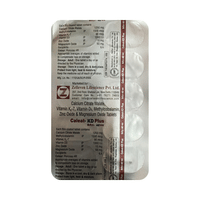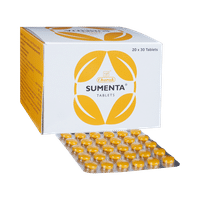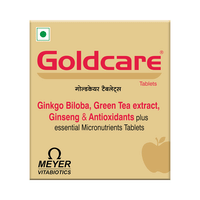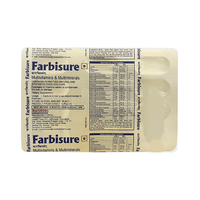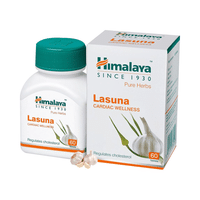Rs.137for 1 strip(s) (10 tablets each)
food interaction for Gladvas F
alcohol interaction for Gladvas F
pregnancy interaction for Gladvas F
lactation interaction for Gladvas F
food
alcohol
pregnancy
lactation
Gladvas F 145mg/10mg Tablet may be taken with or without food, but it is better to take it at a fixed time.
None
None
CAUTION
It is unsafe to consume alcohol with Gladvas F 145mg/10mg Tablet.
UNSAFE
Gladvas F 145mg/10mg Tablet is highly unsafe to use during pregnancy. Seek your doctor's advice as studies on pregnant women and animals have shown significant harmful effects to the developing baby.
UNSAFE
Gladvas F 145mg/10mg Tablet is probably unsafe to use during breastfeeding. Limited human data suggests that the drug may pass into the breastmilk and harm the baby.
CONSULT YOUR DOCTOR
SALT INFORMATION FOR Gladvas F
Fenofibrate(145mg)
Uses
Fenofibrate is used in the treatment of high cholesterol and high triglycerides.
How it works
Fenofibrate is a lipid lowering medication. It works by lowering the levels of triglycerides and "bad" cholesterol (LDL), while raising the levels of "good" cholesterol (HDL).
Common side effects
Abdominal pain, Diarrhea, Nausea, Headache, Flatulence, Vomiting, Increased liver enzymes, Increased creatine phosphokinase (CPK) level in blood, Back pain, Muscle pain, Inflammation of the nose, Rash, Urticaria, Muscle spasm, Muscle weakness, Gallstones, Low blood platelets, Pancreatic inflammation, Pulmonary embolism, Deep vein thrombosis (blood clot in the legs), Anemia (low number of red blood cells), Hypersensitivity, Photosensitivity, Muscle damage, Rhabdomyolysis, Hepatitis (viral infection of liver), Acute renal failure
Rosuvastatin(10mg)
Uses
Rosuvastatin is used in the treatment of high cholesterol, high triglycerides and prevention of heart attack and stroke.
How it works
Rosuvastatin is a lipid-lowering medication (statin). It works by blocking an enzyme (HMG-CoA-reductase) that is required by the body to make cholesterol, thereby lowering "bad" cholesterol (LDL) and triglycerides and raising "good" cholesterol (HDL).
Common side effects
Muscle pain, Weakness, Headache, Abdominal pain, Dizziness, Joint pain, Nausea, Rash, Itching, Protein in urine, Anaphylactic reaction, Low blood platelets, Muscle damage, Rhabdomyolysis, Increased transaminase level in blood, Blood in urine, Jaundice, Systemic lupus erythematosus
SUBSTITUTES FOR Gladvas F
85 Substitutes
85 Substitutes
Sorted By
 Rs. 228.90pay 67% more per Tablet
Rs. 228.90pay 67% more per Tablet Rs. 157.50save 24% more per Tablet
Rs. 157.50save 24% more per Tablet Rs. 246.46pay 77% more per Tablet
Rs. 246.46pay 77% more per Tablet Rs. 343.40pay 146% more per Tablet
Rs. 343.40pay 146% more per Tablet Rs. 226.74pay 62% more per Tablet
Rs. 226.74pay 62% more per Tablet
Expert advice FOR Gladvas F
- It should be taken with food.
- Avoid alcohol consumption while taking this medication.
- Your doctor may check your liver function before starting treatment and regularly thereafter. Notify your doctor if you are more tired than usual, do not feel hungry, or if you have yellow eyes, skin or dark urine.
- Inform your doctor if you experience muscle pain, tenderness, cramps, or weakness while taking Fenofibrate, particularly if it is accompanied by a fever.
- Do not discontinue Fenofibrate without consulting your doctor even if you feel better.
- Fenofibrate is the medication of choice for lowering triglyceride levels in the blood. It can reduce triglycerides by up to 50%.
- It decreases the risk of heart disease and helps prevent stroke and heart attack.
- Take it along with regular exercise and low-fat diet to lower levels of fat in the blood.
- It should be taken with food.
- Your doctor may check your liver function before starting treatment and regularly thereafter. Notify your doctor if you are more tired than usual, do not feel hungry, or if you have yellow eyes, skin or dark urine.
- Avoid alcohol consumption while taking this medication.
- Do not discontinue Fenofibrate without consulting your doctor even if you feel better.
- Inform your doctor if you experience muscle pain, tenderness, cramps, or weakness while taking Fenofibrate, particularly if it is accompanied by a fever.
Frequently asked questions FOR Gladvas F
Fenofibrate
Q. When should Fenofibrate be taken?
Usually, Fenofibrate is taken once daily with a meal. The initial dose of the medicine will depend on the type and age of the patient. Consult your doctor before you start taking the medication and follow the instructions as provided.
Q. Does Fenofibrate raise blood pressure?
There is no or negligible effect on blood pressure in patients with normal blood pressure levels. However, Fenofibrate may lead to a decrease in blood pressure in patients with high blood pressure.
Q. Can Fenofibrate cause kidney problems?
Fenofibrate should be used with caution in patients with kidney disorders. Serum creatinine levels may increase with long-term usage of Fenofibrate but is completely reversible. The evidence of kidney damage with this medicine is rare still the kidney function blood test should be done regularly if there is a possibility of kidney damage. Consult your doctor before taking the medicine. Inform the doctor if you have had any disease and all the medicines that you are taking for a better diagnosis and treatment.
Rosuvastatin
Q. For how long should I take Rosuvastatin?
You may need to take Rosuvastatin for life or for as long as directed by your doctor. The cholesterol levels will be maintained only till you are taking Rosuvastatin. Stopping Rosuvastatin without starting a different treatment may increase your cholesterol levels again. This medicine has only a few side effects and is usually considered safe if taken as directed by the doctor.
Q. Does Rosuvastatin cause weight gain?
No, there is no evidence of Rosuvastatin causing weight gain. If you are taking Rosuvastatin and gaining weight, consult your doctor. The doctor may get some investigations done to know the reason for the weight gain.
Q. Does Rosuvastatin make you tired?
Yes, Rosuvastatin can make you feel tired. This is because it reduces the energy supply to the muscles in the body. However, the exact reason behind the phenomenon is unknown and needs more research. Tiredness usually occurs after exertion. Generalized fatigue is more often in people with heart disease or those suffering from liver illness. Rosuvastatin also causes muscle damage which further worsens the tiredness. Therefore, you must consult your doctor if you feel tired while taking Rosuvastatin.















